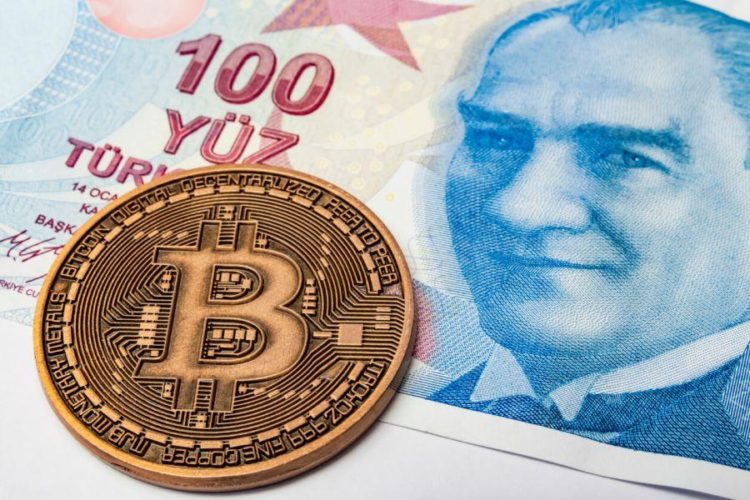Turkey’s central bank has banned the use of cryptoassets in payments, claiming that tokens entail significant risks due to volatile market values, irrevocable transactions and can be used to fund illicit behavior. (Updated at 07:41 UTC: updates throughout the entire text).
In the market, cryptoassets corrected their gains following the news, before somewhat rebounding again.
The bank said that cryptoassets were “neither subject to any regulation and supervision mechanisms nor a central regulatory authority.” In an official statement, the bank claimed it had issued what it called a “Regulation on the Disuse of Cryptoassets in Payments.”
The move follows months of economic turmoil that culminated last month in President Recep Erdogan replacing the central bank governor and appointing a close supporter, Şahap Kavcıoğlu.
And it appears that Kavcıoğlu’s regime has little time for crypto. The release detailed the following reasons for its decision, claiming that cryptoassets:
- are neither subject to any regulation and supervision mechanisms nor a central regulatory authority,
- have market values that can be excessively volatile,
- may be used in illegal actions due to their anonymous structures,
- use wallets that can be stolen or used unlawfully without the authorization of their holders
- make use of irrevocable transactions
Turkey’s central bank banned the use of cryptoassets to purchase goods and services, a week after Turkish authorities demanded user information from trading platforms, Reuters added.
The central bank has struggled to control the descent of the lira in recent months, and in a statement yesterday, it announced that it had decided to keep interest rates at a sky-high 19%.
Ahval reported that Erdogan’s decision to appoint a new governor of the bank last month has “raised concerns among investors that Turkey will keep monetary policy too loose in the face of accelerating inflation and a weak lira.”
Other countries have previously moved to ban the use of crypto in payments, including Russia this year and China back in 2017.
On Twitter, many reacted with shock, but others, including prominent crypto investor Anthony Pompliano, were resolute. The latter wrote that bitcoin (BTC) was “winning in the free market, so governments and central banks try to rig the game.”
“It doesn’t matter,” he concluded, “Adoption continues on unabated in these countries.”
Some speculated that crypto crackdowns have been more frequent in countries with “weaker” currencies, and opined that the measure was an act of desperation as the lira continues its downward slide.
But some predicted a rebound. The entrepreneur Jeff Booth said that “there is no better signal that you need bitcoin rather than central banks trying to ban it.” He added: “I’m betting adoption accelerates.”
I talked with a friend and long time business partner in Turkey today. Most loans priced in USD, and with the currency failing, checkmate for companies with debt. Beautiful country and people, but stuck in a broken system of ever increasing instability.
— Jeff Booth (@JeffBooth) April 16, 2021
Prominent bitcoiner PlanB reacted with ire, opining that “brains and capital” would leave the country in protest and announced that he had “canceled” his “sailing holiday to Turkey” in protest.
And another bitcoiner, pretyflaco, offered some analysis, writing that the Turkish central bank was evidently “afraid of” the “circular Bitcoin economy,” and observing that “buying, selling” and holding crypto had not been banned, perhaps in a bid “to force users through off-ramps.”
Erdogan is currently attempting to complete what the Washington Post has labeled an “insane canal project” that could “trigger the biggest fight in Turkish politics” – a 48km shipping route that will run parallel to the Bosphorus. The project is likely to cost between USD 13bn and USD 25bn.
Cryptonews.com has contacted the central bank for comment.
____
Learn more:
– The Case Of a Plunging Fiat Currency: Turkey’s Struggling Lira
– Turks Turn to Exploring Bitcoin, Ethereum, And Tether as Lira Plummets
– Venezuela Paying Iranian, Turkish Companies in Bitcoin – Report
– Thai Central Bank Sets A Precedent By Banning Baht-pegged Stablecoin
– Latest Episode of India’s Crypto Ban Soap Draws Decidedly Mixed Reviews
– Here Are the Ways Governments Could Attack Bitcoin – and None of them Sound Hot
– Nigerian Senators Blast Central Bank For Its Crypto Ban
Credit: Source link












































































































































